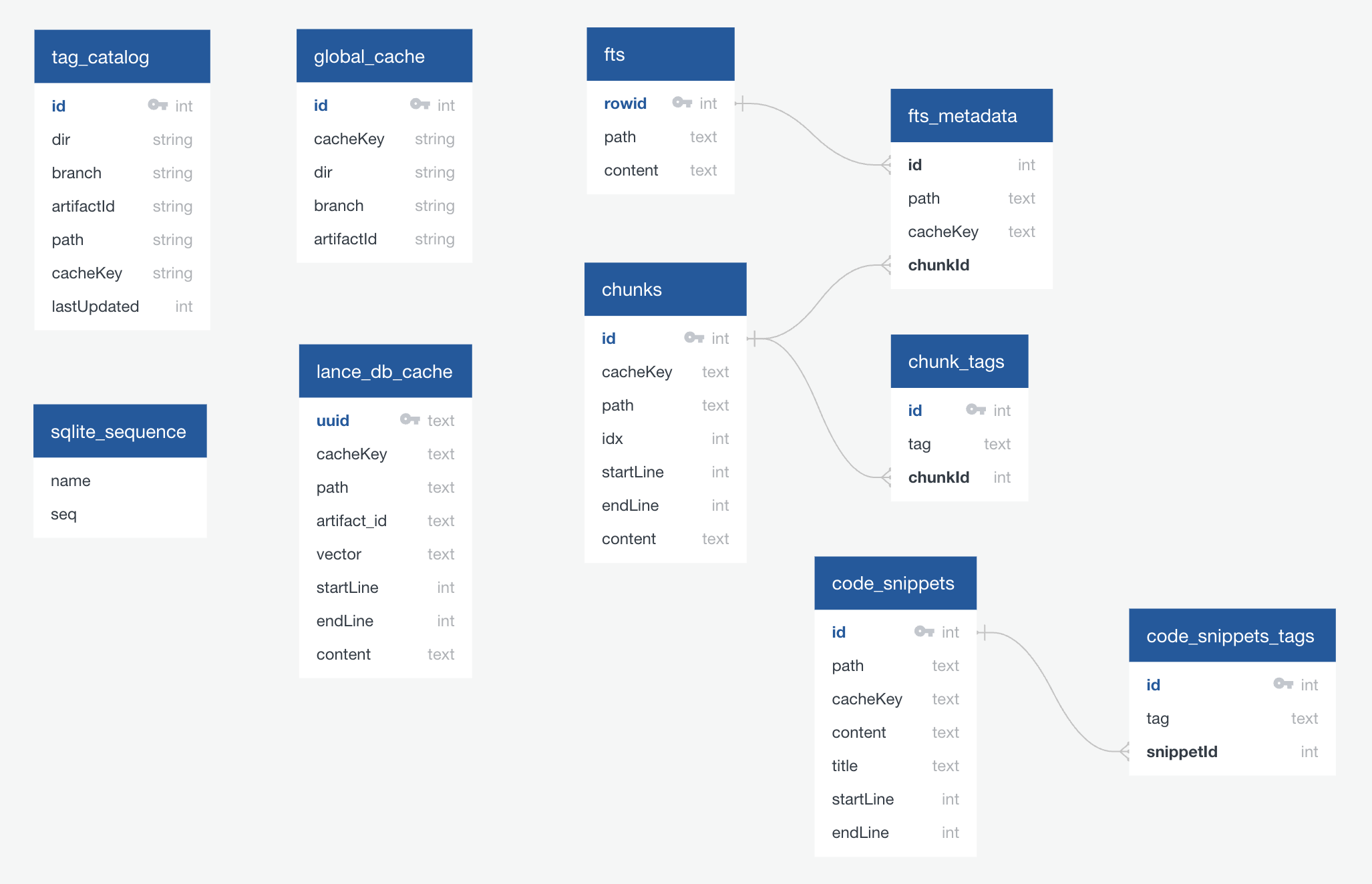Continue 源码分析 - SQLite 数据库设计
SQLite 数据库设计
CREATE TABLE tag_catalog (
id INTEGER PRIMARY KEY AUTOINCREMENT,
dir STRING NOT NULL,
branch STRING NOT NULL,
artifactId STRING NOT NULL,
path STRING NOT NULL,
cacheKey STRING NOT NULL,
lastUpdated INTEGER NOT NULL
)
CREATE TABLE sqlite_sequence(name,seq)
CREATE TABLE global_cache (
id INTEGER PRIMARY KEY AUTOINCREMENT,
cacheKey STRING NOT NULL,
dir STRING NOT NULL,
branch STRING NOT NULL,
artifactId STRING NOT NULL
)
CREATE TABLE chunks (
id INTEGER PRIMARY KEY AUTOINCREMENT,
cacheKey TEXT NOT NULL,
path TEXT NOT NULL,
idx INTEGER NOT NULL,
startLine INTEGER NOT NULL,
endLine INTEGER NOT NULL,
content TEXT NOT NULL
)
CREATE TABLE chunk_tags (
id INTEGER PRIMARY KEY AUTOINCREMENT,
tag TEXT NOT NULL,
chunkId INTEGER NOT NULL,
FOREIGN KEY (chunkId) REFERENCES chunks (id)
)
CREATE TABLE code_snippets (
id INTEGER PRIMARY KEY,
path TEXT NOT NULL,
cacheKey TEXT NOT NULL,
content TEXT NOT NULL,
title TEXT NOT NULL,
startLine INTEGER NOT NULL,
endLine INTEGER NOT NULL
)
CREATE TABLE code_snippets_tags (
id INTEGER PRIMARY KEY AUTOINCREMENT,
tag TEXT NOT NULL,
snippetId INTEGER NOT NULL,
FOREIGN KEY (snippetId) REFERENCES code_snippets (id)
)
CREATE TABLE lance_db_cache (
uuid TEXT PRIMARY KEY,
cacheKey TEXT NOT NULL,
path TEXT NOT NULL,
artifact_id TEXT NOT NULL,
vector TEXT NOT NULL,
startLine INTEGER NOT NULL,
endLine INTEGER NOT NULL,
contents TEXT NOT NULL
)
CREATE TABLE fts_metadata (
id INTEGER PRIMARY KEY,
path TEXT NOT NULL,
cacheKey TEXT NOT NULL,
chunkId INTEGER NOT NULL,
FOREIGN KEY (chunkId) REFERENCES chunks (id),
FOREIGN KEY (id) REFERENCES fts (rowid)
)
CREATE VIRTUAL TABLE fts USING fts5(
path,
content,
tokenize = 'trigram'
)
CREATE TABLE 'fts_data'(id INTEGER PRIMARY KEY, block BLOB)
CREATE TABLE 'fts_idx'(segid, term, pgno, PRIMARY KEY(segid, term)) WITHOUT ROWID
CREATE TABLE 'fts_content'(id INTEGER PRIMARY KEY, c0, c1)
CREATE TABLE 'fts_docsize'(id INTEGER PRIMARY KEY, sz BLOB)
CREATE TABLE 'fts_config'(k PRIMARY KEY, v) WITHOUT ROWID
CREATE UNIQUE INDEX idx_tag_catalog_unique
ON tag_catalog(dir, branch, artifactId, path, cacheKey)
CREATE UNIQUE INDEX idx_global_cache_unique
ON global_cache(cacheKey, dir, branch, artifactId)
虚拟表 fts
CREATE VIRTUAL TABLE fts USING fts5(
path,
content,
tokenize = 'trigram'
)
- USING fts5: 指明这个虚拟表使用 FTS5 模块,FTS5 是 SQLite 的一个扩展,用于高效的全文检索。
- tokenize = ‘trigram’: 分词方式:指定使用三元组(trigram)作为分词策略。三元组分词会将文本分解为连续的三个字符的组合,这有助于提高模糊检索的准确性和效率。
三元组分词的工作原理
三元组分词会将文本分解为连续的三个字符的组合,例如:"Hello, World!" 会被分解为
Helellllolo,o,, W- ` Wo`
Wororlrldld!
三元组分词的优势在于,它可以将文本中的单词分解为更小的片段,这样就可以更容易的匹配到包含拼写错误的单词,或者匹配到相似的单词。
QuickDBD 绘制数据库图表
tag_catalog
---
id PK int
dir string
branch string
artifactId string
path string
cacheKey string
lastUpdated int
sqlite_sequence
---
name
seq
global_cache
---
id PK int
cacheKey string
dir string
branch string
artifactId string
chunks
---
id PK int
cacheKey text
path text
idx int
startLine int
endLine int
content text
chunk_tags
---
id PK int
tag text
chunkId int FK >- chunks.id
code_snippets
---
id PK int
path text
cacheKey text
content text
title text
startLine int
endLine int
code_snippets_tags
---
id PK int
tag text
snippetId int FK >- code_snippets.id
lance_db_cache
---
uuid PK text
cacheKey text
path text
artifact_id text
vector text
startLine int
endLine int
content text
fts
---
rowid PK int
path text
content text
fts_metadata
---
id int FK >- fts.rowid
path text
cacheKey text
chunkId FK >- chunks.id

查询
全文检索(FTS,Full-Text Search)
SELECT fts_metadata.chunkId, fts_metadata.path, fts.content, rank
FROM fts
JOIN fts_metadata ON fts.rowid = fts_metadata.id
JOIN chunk_tags ON fts_metadata.chunkId = chunk_tags.chunkId
WHERE fts MATCH '"Element"' AND chunk_tags.tag IN ('/continuedev/continue-0.9.191-vscode/extensions/vscode::NONE::chunks')
ORDER BY rank
LIMIT 2
- fts MATCH ‘“Element”’: 使用 MATCH 子句进行全文检索,查找包含单词 “Element” 的记录。
- ORDER BY rank: 根据 rank 列对结果进行排序,通常用于根据相关性排序检索结果。
| chunkId | path | content | rank |
|---|---|---|---|
| 21 | /continuedev/continue-0.9.191-vscode/extensions/vscode/wjj/ast.py | class Element(object):… | -5.55171868921467 |
| 22 | /continuedev/continue-0.9.191-vscode/extensions/vscode/wjj/ast.py | class Statement(Element):… | -5.18734716780418 |
| 23 | /continuedev/continue-0.9.191-vscode/extensions/vscode/wjj/ast.py | class Expression(Element): | -5.18208586231724 |
| 53 | /continuedev/continue-0.9.191-vscode/extensions/vscode/wjj/ast.py | class ChainContextPosStatement(Statement):… | -4.21839840515926 |
SELECT fts.content, rank, bm25(fts)
FROM fts
JOIN fts_metadata ON fts.rowid = fts_metadata.id
JOIN chunk_tags ON fts_metadata.chunkId = chunk_tags.chunkId
WHERE fts MATCH '"Element"' AND chunk_tags.tag IN ('/continuedev/continue-0.9.191-vscode/extensions/vscode::NONE::chunks')
LIMIT 2
BM25 算法是一种基于概率的信息检索算法,它通过计算查询词与文档之间的相关性来对检索结果进行排序。
所有 FTS5 表都有一个特殊的隐藏列,名为“rank”。如果当前查询不是全文检索查询(即不包含 MATCH 操作符),则“rank”列的值始终为 NULL。否则,在全文检索查询中,rank 列默认包含与执行 bm25() 辅助函数返回的值相同的值。
从 rank 列读取和在查询中直接使用 bm25() 函数之间的区别在于仅在按返回值排序时才显著。在这种情况下,使用“rank”比使用 bm25() 更快。
| content | rank | bm25(fts) |
|---|---|---|
| class Element(object):… | -5.55171868921467 | -5.55171868921467 |
| class Statement(Element):… | -5.18734716780418 | -5.18734716780418 |
源代码:core/indexing/FullTextSearch.ts
- retrieve
RETRIEVAL_PARAMS.bm25Threshold = -2.5 filter: result.rank <= bm25Threshold